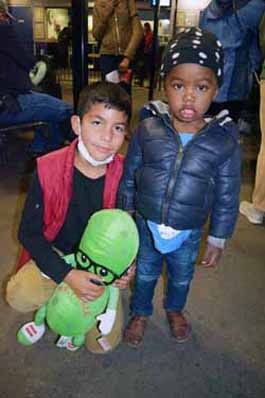Editor’s Note: This story which appeared on Times of San Diego today updates a previous story written by San Diego Jewish World editor Donald H. Harrison on this site earlier this month about the Bus Station project.
By Donald H. Harrison


SAN DIEGO — San Diego has one of the best and most helpful volunteer systems for assisting immigrants who are seeking asylum in the United States to reach the homes of their sponsors.
After immigration officials at the U.S.-Mexico border process applicants for asylum and fit them with electronic ankle bracelets, they are dropped off at San Ysidro, where the Rapid Response Network, a consortium of charitable organizations headed by Jewish Family Service of San Diego, picks them up to take them to their shelter. At the shelter, the families are provided with beds, showers, food, and clothing, as they get ready to travel to their sponsors’ homes. Some will travel by air, but most by bus.
Volunteers transport the asylum seekers to the airport or the bus station and help them to obtain their tickets and explain to them what airline and bus procedures they will need to follow while they are en route to their destinations. Once they arrive at their destinations, the immigrants are required to report to federal authorities to arrange court hearings to determine their eligibility for permanent asylum in the United States.
In some border cities, U.S. immigration officials have no shelter like San Diego’s where the families can rest and get ready for their journeys. So, the officials have been taking the families to the nearest Greyhound Bus Station, where they await news and money for their fares from their sponsors. Waits can sometimes stretch into days. They have been so long that Greyhound recently announced it could no longer cope with the resultant crowding, and therefore has prohibited anyone from entering its waiting rooms without a ticket. As a result, in some cities, immigrant families have been huddling on streets outside the bus station, being exposed at night to the cold.
Not so in San Diego, where the Rapid Response Network makes certain that immigrants have tickets and can therefore access the waiting room. In addition, at least two nights a week, the families are met by the smiling duo of Mimi Pollack and Paula Sassi, who co-founded the Bus Station Project. They not only greet them warmly but also provide them with bags of food and water for their trips as well as stuffed animals for their children and maps of the United States enabling the immigrants to follow the course of their journeys.
Although the Department of Homeland Security has announced a “Remain in Mexico” policy for migrants, to date, this policy has been applied mainly to single adults rather than to families with children. Pollack and Sassi, who collect food, toiletries, blankets and donations from friends and from their own personal supplies, have served as a welcoming committee at the bus station since last July, even before the Rapid Response Network was organized.
The two women make ready for each immigrant family two bags to carry with them. In one, they assemble snacks for the road, such as water, juices, crackers, nutritional bars, cookies, potato chips, and especially fresh fruit. In the second bag, they place such toiletries as soap, toothbrush, toothpaste, shampoo, and lotion. For easy access, the bags are lined along the walls of Pollack’s garage in suburban La Mesa. On the nights that they go to the Greyhound Station, they pack up the trunk of Pollack’s or Sassi’s car with the bags, blankets for the cold weather, and a variety of stuffed animals.
Pollack, an American by birth, spent most of her childhood and early adulthood in Mexico City before returning to the United States, where she had a long career as an English as a Second Language teacher. Able to speak fluent Spanish as well as English and French, she greets the immigrants and explains to them what’s in the bags. Sassi also taught ESL. Both women have a lot of experience working with newly arrived immigrants.
Having grown up, like most Americans, in families that can trace their origins to other countries, the two women empathize with the new immigrants. In their way, Sassi and Pollack are “giving back” to the country of their citizenship, while “paying forward” to the immigrants who, in time to come, may prove to be just as generous to other new arrivals to the United States.
The words written by Emma Lazarus on the base of the Statue of Liberty are a credo for the two Bus Station Project volunteers. The famous inscription reads: “Give me your tired, your poor, Your huddled masses yearning to breathe free, The wretched refuse of your teeming shore. Send these, the homeless, tempest-tossed, to me: I lift my lamp beside the golden door.”
Pollack and Sassi invite those interested in joining them in “lifting the lamp” of America’s promise to contact them at chevalle@hotmail.com and HCI@hotmail.com.
*
Harrison is editor of San Diego Jewish World. He may be contacted via donald.harrison@sdjewishworld.com
Thank you for publishing here, too.